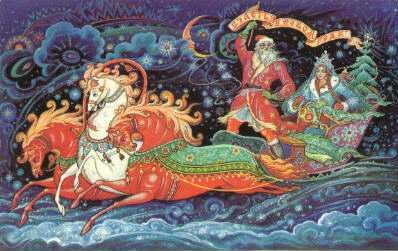In the days of the Soviet Union, Christmas wasn’t celebrated very noticeably, but it was still celebrated even if silently. New Year was the necessary time for enjoyment. Currently Christmas in Russia is widely known normally to be on January seventh. The date is completely different as a result of the Russian Orthodox church uses the previous “Julian” calendar for non secular celebration days. The Orthodox Church conjointly celebrates Advent. However it’s normal dates, beginning on twenty eighth November and planning to the sixth January, therefore it’s forty days long…
The official Christmas and New Year holidays in Russia lasts from thirty first of December to the tenth of January. The Russian Christmas greeting is “S Rozhdestvom!”…
Some Russians fast (don’t eat anything) on Christmas Eve, till the primary star has appeared within the sky. Folks then eat sochivo or kutia a porridge made of wheat or rice served with honey, poppy seeds, fruit (especially berries and dried fruit like raisins), chopped walnuts or typically even fruit jellies!
Kutia is usually eaten from one common bowl, this symbolizes unity. within the past, some families prefer to throw a spoonful of sochivo up on the ceiling. If it stuck to the ceiling, some folks thought it meant they might have sensible luck and would have an honest harvest!
The Russian word for Christmas Eve “sochelnik,”, comes from the word “sochivo”…
Some Orthodox Christian Russian conjointly do not eat any meat or fish throughout the Christmas Eve meal/feast…
Other fashionable Christmas Eve foods embody beetroot soup (borsch) or vegan potluck (solyanka) served with individual vegetable pies (often created with cabbage, potato, or mushroom); salads usually made of vegetables like gherkins, mushrooms or tomatoes, and conjointly potato or different root vegetable salads…
Sauerkraut is main dish within the Christmas Eve meal. It may be served with cranberries, shredded carrot and onion. It would be followed by additional pies or porridge dishes like buckwheat with fried onions and fried mushrooms…
Dessert is usually things like fruit pies, gingerbread and honey bread cookies and fresh / dried fruit with additional nuts…
A drink called Vzvar – (meaning ‘boil-up’) is usually the toast of the meal. It is a sweet drink made of dried fruit and honey, boiled in water. Vzvar is historically at the birth of a toddler, therefore at Christmas it symbolizes the birth of the baby Jesus…

Following the meal, prayers may well be said and folks then visit the midnight Church services. They usually do not wash the dishes till they get home from Church – typically not till 4am or 5am!
The New Year celebrations are very important to Russians (considered as a Christmas)…
This is when – when ‘Father Frost’ (known in Russian as “Ded Moroz” or “Дед Мороз”) brings presents to kids. He’s invariably in the company of his Granddaughter (Snegurochka). On New Year’s eve kids hold hands, create a circle round the Christmas tree. They await the magic to see the star and different lights on the Christmas tree light up!
The standard greeting for Happy New Year is “S Novym Godom.”
WtR

